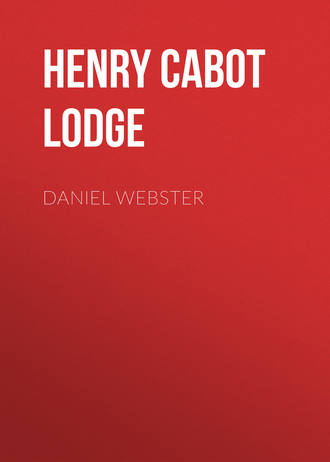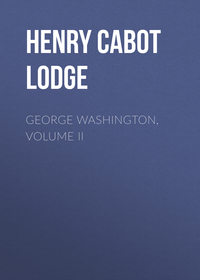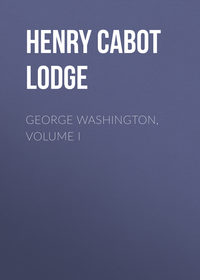 полная версия
полная версияDaniel Webster
Speaking of Mr. Webster at this period, Mr. Benton says:—
"He was the colossal figure on the political stage during that eventful time, and his labors, splendid in their day, survive for the benefit of distant posterity."… "It was a splendid era in his life, both for his intellect and his patriotism. No longer the advocate of classes or interests, he appeared as the great defender of the Union, of the Constitution, of the country, and of the administration to which he was opposed. Released from the bonds of party and the narrow confines of class and corporation advocacy, his colossal intellect expanded to its full proportions in the field of patriotism, luminous with the fires of genius, and commanding the homage not of party but of country. His magnificent harangues touched Jackson in his deepest-seated and ruling feeling, love of country, and brought forth the response which always came from him when the country was in peril and a defender presented himself. He threw out the right hand of fellowship, treated Mr. Webster with marked distinction, commended him with public praise, and placed him on the roll of patriots. And the public mind took the belief that they were to act together in future, and that a cabinet appointment or a high mission would be the reward of his patriotic service. It was a crisis in the life of Mr. Webster. He stood in public opposition to Mr. Clay and Mr. Calhoun. With Mr. Clay he had a public outbreak in the Senate. He was cordial with Jackson. The mass of his party stood by him on the proclamation. He was at a point from which a new departure might be taken: one at which he could not stand still; from which there must be either advance or recoil. It was a case in which will more than intellect was to rule. He was above Mr. Clay and Mr. Calhoun in intellect, below them in will: and he was soon seen cooperating with them (Mr. Clay in the lead) in the great measure condemning President Jackson."
This is of course the view of a Jacksonian leader, but it is none the less full of keen analysis and comprehension of Mr. Webster, and in some respects embodies very well the conditions of the situation. Mr. Benton naturally did not see that an alliance with Jackson was utterly impossible for Mr. Webster, whose proper course was therefore much less simple than it appeared to the Senator from Missouri. There was in reality no common ground possible between Webster and Jackson except defence of the national integrity. Mr. Webster was a great orator, a splendid advocate, a trained statesman and economist, a remarkable constitutional lawyer, and a man of immense dignity, not headstrong in temper and without peculiar force of will. Jackson, on the other hand, was a rude soldier, unlettered, intractable, arbitrary, with a violent temper and a most despotic will. Two men more utterly incompatible it would have been difficult to find, and nothing could have been more wildly fantastic than to suppose an alliance between them, or to imagine that Mr. Webster could ever have done anything but oppose utterly those mad gyrations of personal government which the President called his "policy."
Yet at the same time it is perfectly true that just after the passage of the tariff bill Mr. Webster was at a great crisis in his life. He could not act with Jackson. That way was shut to him by nature, if by nothing else. But he could have maintained his position as the independent and unbending defender of nationality and as the foe of compromise. He might then have brought Mr. Clay to his side, and remained himself the undisputed head of the Whig party. The coalition between Clay and Calhoun was a hollow, ill-omened thing, certain to go violently to pieces, as, in fact, it did, within a few years, and then Mr. Clay, if he had held out so long, would have been helpless without Mr. Webster. But such a course required a very strong will and great tenacity of purpose, and it was on this side that Mr. Webster was weak, as Mr. Benton points out. Instead of waiting for Mr. Clay to come to him, Mr. Webster went over to Clay and Calhoun, and formed for a time the third in that ill-assorted partnership. There was no reason for his doing so. In fact every good reason was against it. Mr. Clay had come to Mr. Webster with his compromise, and had been met with the reply "that it would be yielding great principles to faction; and that the time had come to test the strength of the Constitution and the government." This was a brave, manly answer, but Mr. Clay, nationalist as he was, had straightway deserted his friend and ally, and gone over to the separatists for support. Then a sharp contest had occurred between Mr. Webster and Mr. Clay in the debate on the tariff; and when it was all over, the latter wrote with frank vanity and a slight tinge of contempt: "Mr. Webster and I came in conflict, and I have the satisfaction to tell you that he gained nothing. My friends flatter me with my having completely triumphed. There is no permanent breach between us. I think he begins already to repent his course." Mr. Clay was intensely national, but his theory of preserving the Union was by continual compromise, or, in other words, by constant yielding to the aggressive South. Mr. Webster's plan was to maintain a firm attitude, enforce absolute submission to all constitutional laws, and prove that agitation against the Union could lead only to defeat. This policy would not have resulted in rebellion, but, if it had, the hanging of Calhoun and a few like him, and the military government of South Carolina, by the hero of New Orleans, would have taught slave-holders such a lesson that we should probably have been spared four years of civil war. Peaceful submission, however, would have been the sure outcome of Mr. Webster's policy. But a compromise appealed as it always does to the timid, balance-of-power party. Mr. Clay prevailed, and the manufacturers of New England, as well as elsewhere, finding that he had secured for them the benefit of time and of the chapter of accidents, rapidly came over to his support. The pressure was too much for Mr. Webster. Mr. Clay thought that if Mr. Webster "had to go over the work of the last few weeks he would have been for the compromise, which commands the approbation of a great majority." Whether Mr. Webster repented his opposition to the compromise no one can say, but the change of opinion in New England, the general assent of the Whig party, and the dazzling temptations of presidential candidacy prevailed with him. He fell in behind Mr. Clay, and remained there in a party sense and as a party man for the rest of his life.
The terrible prize of the presidency was indeed again before his eyes. Mr. Clay's overthrow at the previous election had removed him, for the time being at least, from the list of candidates, and thus freed Mr. Webster from his most dangerous rival. In the summer of 1833 Mr. Webster made a tour through the Western States, and was received everywhere with enthusiasm, and hailed as the great expounder and defender of the Constitution. The following winter he stood forward as the preëminent champion of the Bank against the President. Everything seemed to point to him as the natural candidate of the opposition. The Legislature of Massachusetts nominated him for the presidency, and he himself deeply desired the office, for the fever now burned strongly within him. But the movement came to nothing. The anti-masonic schism still distracted the opposition. The Kentucky leaders were jealous of Mr. Webster, and thought him "no such man" as their idol Henry Clay. They admitted his greatness and his high traits of character, but they thought his ambition mixed with too much self-love. Governor Letcher wrote to Mr. Crittenden in 1836 that Clay was more elevated, disinterested and patriotic than Webster, and that the verdict of the country had had a good effect on the latter. Despite the interest and enthusiasm which Mr. Webster aroused in the West, he had no real hold upon that section or upon the masses of the people and the Western Whigs turned to Harrison. There was no hope in 1836 for Mr. Webster, or, for that matter, for his party either. He received the electoral vote of faithful Massachusetts, and that was all. As it was then, so it had been at the previous election, and so it was to continue to be at the end of every presidential term. There never was a moment when Mr. Webster had any real prospect of attaining to the presidency. Unfortunately he never could realize this. He would have been more than human, perhaps, if he had done so. The tempting bait hung always before his eyes. The prize seemed to be always just coming within his reach, and was really never near it. But the longing had entered his soul. He could not rid himself of the idea of this final culmination to his success; and it warped his feelings and actions, injured his career, and embittered his last years.
This notice of the presidential election of 1836 has somewhat anticipated the course of events. Soon after the tariff compromise had been effected, Mr. Webster renewed his relations with Mr. Clay, and, consequently, with Mr. Calhoun, and their redoutable antagonist in the President's chair soon gave them enough to do. The most immediate obstacle to Mr. Webster's alliance with General Jackson was the latter's attitude in regard to the bank. Mr. Webster had become satisfied that the bank was, on the whole, a useful and even necessary institution. No one was better fitted than he to decide on such a question, and few persons would now be found to differ from his judgment on this point. In a general way he may be said to have adopted the Hamiltonian doctrine in regard to the expediency and constitutionality of a national bank. There were intimations in the spring of 1833 that the President, not content with preventing the re-charter of the bank, was planning to strike it down, and practically deprive it of even the three years of life which still remained to it by law. The scheme was perfected during the summer, and, after changing his Secretary of the Treasury until he got one who would obey, President Jackson dealt his great blow. On September 26 Mr. Taney signed the order removing the deposits of the government from the Bank of the United States. The result was an immediate contraction of loans, commercial distress, and great confusion.
The President had thrown down the gage, and the leaders of the opposition were not slow to take it up. Mr. Clay opened the battle by introducing two resolutions,—one condemning the action of the President as unconstitutional, the other attacking the policy of removal, and a long and bitter debate ensued. A month later, Mr. Webster came forward with resolutions from Boston against the course of the President. He presented the resolutions in a powerful and effective speech, depicting the deplorable condition of business, and the injury caused to the country by the removal of the deposits. He rejected the idea of leaving the currency to the control of the President, or of doing away entirely with paper, and advocated the re-charter of the present bank, or the creation of a new one; and, until the time for that should arrive, the return of the deposits, with its consequent relief to business and a restoration of stability and of confidence for the time being at least. He soon found that the administration had determined that no law should be passed, and that the doctrine that Congress had no power to establish a bank should be upheld. He also discovered that the constitutional pundit in the White House, who was so opposed to a single national bank, had created, by his own fiat, a large number of small national banks in the guise of state banks, to which the public deposits were committed, and the collection of the public revenues intrusted. Such an arbitrary policy, at once so ignorant, illogical, and dangerous, aroused Mr. Webster thoroughly, and he entered immediately upon an active campaign against the President. Between the presentation of the Boston resolutions and the close of the session he spoke on the bank, and the subjects necessarily connected with it, no less than sixty-four times. He dealt entirely with financial topics,—chiefly those relating to the currency, and with the constitutional questions raised by the extension of the executive authority. This long series of speeches is one of the most remarkable exhibitions of intellectual power ever made by Mr. Webster, or indeed by any public man in our history. In discussing one subject in all its bearings, involving of necessity a certain amount of repetition, he not only displayed an extraordinary grasp of complicated financial problems and a wide knowledge of their scientific meaning and history, but he showed an astonishing fertility in argument, coupled with great variety and clearness of statement and cogency of reasoning. With the exception of Hamilton, Mr. Webster is the only statesman in our history who was capable of such a performance on such a subject, when a thorough knowledge had to be united with all the resources of debate and all the arts of the highest eloquence.
The most important speech of all was that delivered in answer to Jackson's "Protest," sent in as a reply to Mr. Clay's resolutions which had been sustained by Mr. Webster as chairman of the Committee on Finance. The "Protest" asserted, in brief, that the Legislature could not order a subordinate officer to perform certain duties free from the control of the President; that the President had the right to put his own conception of the law into execution; and, if the subordinate officer refused to obey, then to remove such officer; and that the Senate had therefore no right to censure his removal of the Secretary of the Treasury, in order to reach the government deposits. To this doctrine Mr. Webster replied with great elaboration and ability. The question was a very nice one. There could be no doubt of the President's power of removal, and it was necessary to show that this power did not extend to the point of depriving Congress of the right to confer by law specified and independent powers upon an inferior officer, or of regulating the tenure of office. To establish this proposition, in such a way as to take it out of the thick and heated atmosphere of personal controversy, and put it in a shape to carry conviction to the popular understanding, was a delicate and difficult task, requiring, in the highest degree, lucidity and ingenuity of argument. It is not too high praise to say that Mr. Webster succeeded entirely. The real contest was for the possession of that debatable ground which lies between the defined limits of the executive and legislative departments. The struggle consolidated and gave coherence to the Whig party as representing the opposition to executive encroachments. At the time Jackson, by his imperious will and marvellous personal popularity, prevailed and obtained the acceptance of his doctrines. But the conflict has gone on, and the balance of advantage now rests with the Legislature. This tendency is quite as dangerous as that of which Jackson was the exponent, if not more so. The executive department has been crippled; and the influence and power of Congress, and especially of the Senate, have become far greater than they should be, under the system of proportion and balance embodied in the Constitution. Despite Jackson's victory there is, to-day, far more danger of undue encroachments on the part of the Senate than on that of the President.
At the next session the principal subject of discussion was the trouble with France. Irritated at the neglect of the French government to provide funds for the payment of their debt to us, Jackson sent in a message severely criticising them, and recommending the passage of a law authorizing reprisals on French property. The President and his immediate followers were eager for war, Calhoun and his faction regarded the whole question as only matter for "an action of assumpsit," while Mr. Webster and Mr. Clay desired to avoid hostilities, but wished the country to maintain a firm and dignified attitude. Under the lead of Mr. Clay, the recommendation of reprisals was rejected, and under that of Mr. Webster a clause smuggled into the Fortification Bill to give the President three millions to spend as he liked was struck out and the bill was subsequently lost. This affair, which brought us to the verge of war with France, soon blew over, however, and caused only a temporary ripple, although Mr. Webster's attack on the Fortification Bill left a sting behind.
In this same session Mr. Webster made an exhaustive speech on the question of executive patronage and the President's power of appointment and removal. He now went much farther than in his answer to the "Protest," asserting not only the right of Congress to fix the tenure of office, but also that the power of removal, like the power of appointment, was in the President and Senate jointly. The speech contained much that was valuable, but in its main doctrine was radically unsound. The construction of 1789, which decided that the power of removal belonged to the President alone, was clearly right, and Mr. Webster failed to overthrow it. His theory, embodied in a bill which provided that the President should state to the Senate, when he appointed to a vacancy caused by removal, his reasons for such removal, was thoroughly mischievous. It was more dangerous than Jackson's doctrine, for it tended to take the power of patronage still more from a single and responsible person and vest it in a large and therefore wholly irresponsible body which has always been too much inclined to degenerate into an office-broking oligarchy, and thus degrade its high and important functions. Mr. Webster argued his proposition with his usual force and perspicuity, but the speech is strongly partisan and exhibits the disposition of an advocate to fit the Constitution to his particular case, instead of dealing with it on general and fundamental principles.
The session closed with a resolution offered by Mr. Benton to expunge the resolutions of censure upon the President, which was overwhelmingly defeated, and was then laid upon the table, on the motion of Mr. Webster. He also took the first step to prevent the impending financial disaster growing out of the President's course toward the bank, by carrying a bill to stop the payment of treasury warrants by the deposit banks in current banknotes, and to compel their payment in gold and silver. The rejection of Benton's resolutions served to embitter the already intense conflict between the President and his antagonists, and Mr. Webster's bill, while it showed the wisdom of the opposition, was powerless to remedy the mischief which was afoot.
In this same year (1835) the independence of Texas was achieved, and in the session of 1835-36 the slavery agitation began its march, which was only to terminate on the field of battle and in the midst of contending armies. Mr. Webster's action at this time in regard to this great question, which was destined to have such an effect upon his career, can be more fitly narrated when we come to consider his whole course in regard to slavery in connection with the "7th of March" speech. The other matters of this session demand but a brief notice. The President animadverted in his message upon the loss of the Fortification Bill, due to the defeat of the three million clause. Mr. Webster defended himself most conclusively and effectively, and before the session closed the difficulties with France were practically settled. He also gave great attention to the ever-pressing financial question, trying to mitigate the evils which the rapid accumulation of the public funds was threatening to produce. He felt that he was powerless, that nothing indeed could be done to avert the approaching disaster; but he struggled to modify its effects and delay its progress.
Complications increased rapidly during the summer. The famous "Specie Circular," issued by the Secretary of the Treasury without authority of law, weakened all banks which did not hold the government deposits, forced them to contract their loans, and completed the derangement of domestic exchange. This grave condition of affairs confronted Congress when it assembled in December, 1836. A resolution was introduced to rescind the Specie Circular, and Mr. Webster spoke at length in the debate, defining the constitutional duties of the government toward the regulation of the currency, and discussing in a masterly manner the intricate questions of domestic exchanges and the excessive circulation of bank notes. On another occasion he reiterated his belief that a national bank was the true remedy for existing ills, but that only hard experience could convince the country of its necessity.
At this session the resolution to expunge the vote of censure of 1833 was again brought forward by Mr. Benton. The Senate had at last come under the sway of the President, and it was clear that the resolution would pass. This precious scheme belongs to the same category of absurdities as the placing Oliver Cromwell's skull on Temple Bar, and throwing Robert Blake's body on a dung-hill by Charles Stuart and his friends. It was not such a mean and cowardly performance as that of the heroes of the Restoration, but it was far more "childish-foolish." The miserable and ludicrous nature of such a proceeding disgusted Mr. Webster beyond measure. Before the vote was taken he made a brief speech that is a perfect model of dignified and severe protest against a silly outrage upon the Constitution and upon the rights of senators, which he was totally unable to prevent. The original censure is part of history. No "black lines" can take it out. The expunging resolution, which Mr. Curtis justly calls "fantastic and theatrical," is also part of history, and carries with it the ineffaceable stigma affixed by Mr. Webster's indignant protest.
Before the close of the session Mr. Webster made up his mind to resign his seat in the Senate. He had private interests which demanded his attention, and he wished to travel both in the United States and in Europe. He may well have thought, also, that he could add nothing to his fame by remaining longer in the Senate. But besides the natural craving for rest, it is quite possible that he believed that a withdrawal from active and official participation in politics was the best preparation for a successful candidacy for the presidency in 1840. This certainly was in his mind in the following year (1838), when the rumor was abroad that he was again contemplating retirement from the Senate; and it is highly probable that the same motive was at bottom the controlling one in 1837. But whatever the cause of his wish to resign, the opposition of his friends everywhere, and of the Legislature of Massachusetts, formally and strongly expressed, led him to forego his purpose. He consented to hold his seat for the present, at least, and in the summer of 1837 made an extended tour through the West, where he was received as before with the greatest admiration and enthusiasm.
The distracted condition of the still inchoate Whig party in 1836, and the extraordinary popularity of Jackson, resulted in the complete victory of Mr. Van Buren. But the General's chosen successor and political heir found the great office to which he had been called, and which he so eagerly desired, anything but a bed of roses. The ruin which Jackson's wild policy had prepared was close at hand, and three months after the inauguration the storm burst with full fury. The banks suspended specie payments and universal bankruptcy reigned throughout the country. Our business interests were in the violent throes of the worst financial panic which had ever been known in the United States. The history of Mr. Van Buren's administration, in its main features, is that of a vain struggle with a hopeless network of difficulties, and with the misfortune and prostration which grew out of this wide-spread disaster. It is not necessary here to enter into the details of these events. Mr. Webster devoted himself in the Senate to making every effort to mitigate the evils which he had prophesied, and to prevent their aggravation by further injudicious legislation. His most important speech was delivered at the special session against the first sub-treasury bill and Mr. Calhoun's amendment. Mr. Calhoun, who had wept over the defeat of the bank bill in 1815, was now convinced that all banks were mistakes, and wished to prevent the acceptance of the notes of specie paying banks for government dues. Mr. Webster's speech was the fullest and most elaborate he ever made on the subject of the currency, and the relations of the government to it. His theme was the duty and right of the general government under the Constitution to regulate and control the currency, and his masterly argument was the best that has ever been made, leaving in fact nothing to be desired.





